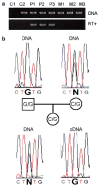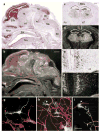LRRTM1 on chromosome 2p12 is a maternally suppressed gene that is associated paternally with handedness and schizophrenia
- PMID: 17667961
- PMCID: PMC2990633
- DOI: 10.1038/sj.mp.4002053
LRRTM1 on chromosome 2p12 is a maternally suppressed gene that is associated paternally with handedness and schizophrenia
Abstract
Left-right asymmetrical brain function underlies much of human cognition, behavior and emotion. Abnormalities of cerebral asymmetry are associated with schizophrenia and other neuropsychiatric disorders. The molecular, developmental and evolutionary origins of human brain asymmetry are unknown. We found significant association of a haplotype upstream of the gene LRRTM1 (Leucine-rich repeat transmembrane neuronal 1) with a quantitative measure of human handedness in a set of dyslexic siblings, when the haplotype was inherited paternally (P=0.00002). While we were unable to find this effect in an epidemiological set of twin-based sibships, we did find that the same haplotype is overtransmitted paternally to individuals with schizophrenia/schizoaffective disorder in a study of 1002 affected families (P=0.0014). We then found direct confirmatory evidence that LRRTM1 is an imprinted gene in humans that shows a variable pattern of maternal downregulation. We also showed that LRRTM1 is expressed during the development of specific forebrain structures, and thus could influence neuronal differentiation and connectivity. This is the first potential genetic influence on human handedness to be identified, and the first putative genetic effect on variability in human brain asymmetry. LRRTM1 is a candidate gene for involvement in several common neurodevelopmental disorders, and may have played a role in human cognitive and behavioral evolution.
Figures





Comment in
-
Supporting evidence for LRRTM1 imprinting effects in schizophrenia.Mol Psychiatry. 2009 Aug;14(8):743-5. doi: 10.1038/mp.2009.28. Mol Psychiatry. 2009. PMID: 19626025 No abstract available.
References
-
- Rogers LJ, Andrew R, editors. Comparative Vertebrate Lateralization. Cambridge University Press; Cambridge, UK: 2002.
-
- Hugdahl K, Davidson RJ, editors. The Asymmetrical Brain. MIT Press; Cambridge, MA: 2003.
-
- Mevorach C, Humphreys GW, Shalev L. Attending to local form while ignoring global aspects depends on handedness: evidence from TMS. Nat Neurosci. 2005;8:276–277. - PubMed
Publication types
MeSH terms
Substances
Grants and funding
LinkOut - more resources
Full Text Sources
Medical
Molecular Biology Databases

